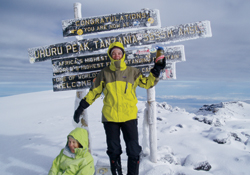Essay: Alison Lister
 |
| Photo: Alison Lister |
My experience as a melting-pot
The compulsion in all of us to search for the truth, to search for the meaning of life and the origin of the world, is the force uniting us on the Compact Muon Solenoid detector experiment – 2000+ people, from 182 institutions, in 38 different countries. We are all aware that our goal–completing this amazing complexity that is the Large Hadron Collider–cannot be achieved by working isolated in our own garden sheds. It can only be achieved by pooling together as many intellectual and human resources as possible.
Working among Swiss, French, Italians, Germans, Austrians, Americans, Serbs, Russians, and Japanese brings benefits beyond the science. We must learn to communicate across borders of language and nationality, and beyond the specificities of our individual systems within the experiment. Ive always said that I was 100 percent Swiss (education) and 100 percent British (blood). I would have to add my university education in Britain, a PhD in the Germanspeaking part of Switzerland, over a year in the United States, and now a postdoc position at an American institution. I guess I am becoming a personal melting-pot.
The learning curve was particularly steep for me in the beginning: for example, adapting to the Italian schedule where 2 p.m. meetings start half an hour late, and tomorrow means sometime next week; or to the Austrian schedule, where they get upset if you are five minutes late. Everyone adapts: the Italians become more punctual; the Austrians, more lenient; sometimes the meetings even finish on time! Adapting to a global schedule can mean staying late on a Friday night to give a presentation by videoconference with the CDF experiment at Fermilab, then rushing up a mountain in the dark on snowshoes so as not to miss a good party.
Global collaborations would not be possible without Internet communication. Yet face-to-face meetings remain crucial. Email and even video can sometimes conceal what people are thinking: Are they trying to be ironic or serious? It is easy to get upset when another person is only trying to be objective and helpful. With the delays of email exchange, a misunderstanding can go a long way before being resolved.
Meanwhile, the CERN cafeteria is an ideal anthropological research center. A morning (or afternoon) coffee encounter usually starts with a couple of emails or phone calls to set time and location, followed by an extended debate about what to drink, who would pay, and whether chocolate was needed at that particular time. Then comes the choice of table: Dining tables are for more formal meetings, involving extensive use of laptops; coffee tables are for more relaxed chats. The tables under the (artificial) palm trees are particularly sought after! The discussion begins slowly, perhaps with comments about the weather, but very quickly moves on to the business at hand. The rest of the world seems to vanish for a while, when it seems that only that table and that topic can possibly exist.
Lunch is often the time to speak ones own language, or discuss local politics, but also to exchange ideas and techniques between different experiments. I have participated in discussions about airplanes and motorbikes; the looming energy crisis; German and Swiss politics; the status of the CMS ECAL supermodule assembly; the role of women in physics and in politics; the merits of going up a particular 4000-meter peak that coming weekend; and, of course, debates on the quality of the restaurant food. Generally, the only point of agreement is that CERNs food is better than Fermilabs.
Then comes the four oclock coffee. Some groups go as far as having afternoon coffee (or sometimes tea) every day together. This is the best place to bond with the rest of the group, to exchange opinions on the latest hiking gear (or skis), or the new electronics chip, and often to smooth over differences that might have occurred (often all in the same conversation). Dinner might take five minutes, before going back to work; or a couple of hours over a few beers. The former I experienced extensively towards the end of my PhD. The latter is more prominent among people at CERN on short visits, or among conference participants who dont want to go downtown for the evening. They may linger for another opportunity to communicate across borders of language and nationality, to seek truth and meaning as they see it.
Alison Lister is a postdoc for UC Davis (but has never been there), working on the CDF experiment at Fermilab and the CMS experiment at CERN. Following her degree at Oxford University, she returned home to complete a PhD at ETH Zurich, only to find herself split between the flat Chicago suburbs and the mountains around Geneva. An accomplished climber, Lister is pictured at Uhuru Peak in Tanzania, the true summit of Mount Kilimanjaro and the highest point in Africa (5895 meters).
Click here to download the pdf version of this article.


